Al Humphreys on the ever-evolving nature of adventure
Why the former Nat Geo Adventurer of the Year has swapped epic expeditions for exploring his local map.
It’s hard for me to get my head around the fact that my conversation with Alastair Humphreys is rescheduled because he has to drop his son at the dentist. I’ve been following Al for over a decade, and though I’m aware that he has kids, I can’t imagine him completing a mundane task like visiting the dentist without feeling the need to, you know, strip naked and launch himself into a freezing river.
When we do find time to talk, I’m pleased to discover that Al does in fact spend a lot of time jumping in rivers with his kids (not naked, obviously). He assures me, however, that he’s more than capable of simply depositing them at the dentist. ‘I want them to enjoy nature and adventure stuff,’ he says, ‘but I don’t want them to grow up and think: Dad used to take us to all those fucking mountains and I’m never doing anything like that again. To be honest, they’re just about teenagers now and pretty much addicted to their screens, so trying to get them out the front door is a bit of a challenge these days. But that seems to be the curse of every parent I know.’
As far as parents go, Al seems like a pretty cool one to have. In 2001, at the age of 24, he pedalled away from his Yorkshire home and continued for another 74,000 kilometres, returning four years later having circumnavigated the globe. He then proceeded to knock off a number of wild adventures including walking across India, rowing the Atlantic, walking the Empty Quarter desert, canoeing the Yukon and – perhaps most impressively – learning the violin so he could busk his way around Spain. He was named National Geographic’s Adventurer of the Year in 2012, though the title came not for a feat of epic endurance, as one might imagine, but for coining and promoting the idea of microadventures; small, achievable adventures that “normal people” with 9-to-5s can fit into their schedule.
‘For a bunch of years I was really annoyed that I was known as Mr Microadventures when I wanted to be more like Mr Tough Guy,’ Al says, reflecting on his Adventurer of the Year title. ‘But now I’m actually really pleased. I think it’s a little more interesting than yet another middle-class white guy doing tough stuff. I kept kind of hoping that it would go away so I could get back to doing other things, but people have been continually interested in it, which I suppose suggests it has a resonance and a relevance and a reach.’
A resonance and reach, no doubt, with a quick scan of Instagram revealing over 60,000 posts with the #microadventures tag. And though Al may not have been entirely pleased with being known as Mr Microadventure, he can recognise that it was one of several evolutions of what ‘adventure’ means to him.
As a young man, Al believed that adventure meant pushing himself physically and doing massive, crazy things in inhospitable environments; cycling across Siberia in winter, for example, or hauling a 300-kilogram cart across 1500 kilometres of Arabian Desert. ‘It then moved onto microadventures,’ he says, ‘where I really started to get a kick out of sharing my love of wild places by encouraging people to squeeze in adventure around the margins of their busy lives.’ He realised that a small adventure is no worse than a big adventure – it’s just smaller. ‘Like a shot of espresso versus a giant latté. They’re both cups of coffee, it’s just a matter of how you squeeze them in around your life.’
“That got me thinking that adventure was more about the way you approach your life. That perhaps it doesn’t even need to happen in wild places.”
It was a 2016 trip to Spain that really broadened Al’s concept of adventure. For years he’d dreamed of emulating Laurie Lee’s book As I Walked Out One Midsummer Morning, in which Lee wanders around Spain with nothing but his violin. The only problem was Al couldn’t play the violin. Spurred by the realisation that he’d become too comfortable living what had seemed, on the surface, an adventurous existence, Al wanted to test himself, to risk uncertainty and failure in a new way. So he bit the bullet, bought a violin and, after seven months of lessons, flew to Spain to play his first screeching notes in public.
‘If you’re a violinist, that wouldn’t be an adventure,’ Al explains. ‘It would be your day job. But for me it was vulnerability and fear and being out of my depth, but also this thrilling possibility of success. All the stuff you get from gnarly expeditions I got from just standing up and playing the violin really badly in a little village plaza. That got me thinking that adventure was more about the way you approach your life. That perhaps it doesn’t even need to happen in wild places.’
The book that came out of the Spain trip – My Midsummer Morning – is one that Al found difficult to write; in its published form, at least. ‘I wrote the book and sent it to the publisher and they were kind of like, eh, nothing really happens. It forced me to pivot and think about the reasons I’d done the Spain trip, which was to do with my struggle trying to be both Adventure Guy and Good Dad; the incompatibility of those two things. It’s something I’d never written about, because I wanted to keep that side of my life away from the public, but I felt slightly disingenuous because here, on the internet, I’m portraying this adventurous guy having a brilliant life while loads of people are having a really shit time trying to be parents to kids who can be a pain in the arse.’
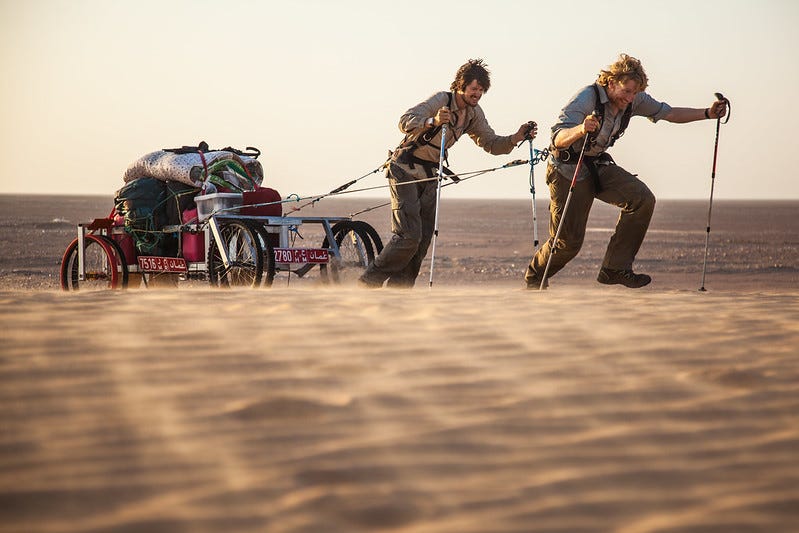
Though Al didn’t particularly enjoy writing about his personal life, the responses he gets to My Midsummer Morning make him believe that it was worth the effort. Now he’s hoping that his audience will be on board with his new book, Local, which he sees as a departure from his previous work. The book details the year Al spent exploring a single map of the area he now calls home, just outside of London. It’s a celebration of curiosity and time spent outdoors, as well as a rallying cry to protect the wild places on our doorstep.
‘My thing, once a week, was to go and see a 1x1 kilometre grid square in as much depth as possible,’ says Al. The squares were chosen by a random number generator to avoid his bias of heading straight to the woods. ‘Except for the first week, when I chose what looked like the most boring square on the map. A square with nothing. No contour lines, just emptiness. I thought: that looks really boring, so I’ll go there and if it’s as boring as it looks, I might give up on this idea straight away. I went there thinking that I’d see everything right away and suddenly two hours had passed by and I’d only gone 200 yards down the road. That blew my mind. If you look really carefully, there’s an infinite amount of stuff where you are right now. You can look out the window and spend a lifetime writing about that view if you pay enough attention.’
For Al, that first grid square was proof of concept. ‘It was so rainy and grey and pretty shitty,’ he says. ‘Muddy and boring old England. I walked down this little path to this crappy bench and looked at this bulrush reed thing. I have an app on my phone that tells you the names of plants, so that got me learning about this crappy boring plant and I suddenly became really interested in it. Before I knew it, I was thinking about how where I was sitting was just this tiny bit of England, which is part of Britain, which is part of Europe, which is part of the world, and then I was scrolling through Instagram looking at photos from the James Webb Telescope. Something like eight billion galaxies in a picture. So I was looking at this reed and my head was a bit blown in terms of where I’m going to pay my attention. It also got me thinking: with this whole universe out there, how the hell do you choose where to explore? It’s impossible. So I decided I might as well explore right here, where I am right now, and really pay attention to it.’
Local marks yet another shift for Al, one which has seen him become increasingly vocal on social media regarding UK environmental issues like clean rivers, land access and rewilding. These issues have always been important to him, but it’s taken him a number of years to become comfortable using his platform to speak out about them.
‘For quite a while I was building an online profile and consciously avoided anything political at all,’ he says. ‘My mission on social media was to get people out into nature. That’s it. Anything that was annoying me about the world was my business. But I’ve now decided: stuff it. I’ve got this online audience so I’m going to say stuff that matters to me. The other part is my own personal evolution. I think all of us have become more aware and concerned about these things over the last 10 years. I’ve gotten older and I suppose my priorities have changed.’
He describes himself – somewhat self-deprecatingly – as having become “an annoying, vegan, tree-hugging pest”, but perhaps “role model” is a more appropriate descriptor. After all, Al has shown that it’s possible for one to adapt to a changing world without losing one’s core identity; in his case, that of an adventurer. He has stopped flying for fear that it not only damages the wild places he loves, but also encourages others to fly around the world. There’s an amplification effect, he says, because of his platform. And though he has always loved flying to far-off places, the decision to stop was what led him to exploring his local map, which in turn led him towards really slowing down and paying attention to the nature on his doorstep in a way he’d never done before.
‘Nobody invites me to their parties, but it feels more important to me than going to climb a mountain or something,’ Al says. ‘I now get more pleasure and stimulation from this side of things. I’m not going to diss adventure for the sheer hell of it, because that’s brilliant and I had 20 years of it. I think there’s a time in your life for climbing a mountain for the joy of it, but for me right now it doesn’t feel as interesting.’
What Al is now wrestling with is the best way to convey what he has learned while exploring his local map and researching this new book. ‘I’m trying to say “going and exploring your local woods is really great”, rather than “it’s a bit crap compared to flying to Bali, but we’re all going to die if you don’t”. That’s a really negative way of looking at it, so trying to find optimistic solutions to things is the real challenge, I think.’
Al is optimistic, however, that answers may be closer than we think; in our own backyards, even. ‘If you can start to care about your own little neighbourhood, you’re actually starting to care about the planet,’ he says. ‘But if you try and care about the entire planet at once, that’s just too big and impossible. So start tiny, start local. The steps you take will become steps to much bigger things.’
Order Local, by Alastair Humphreys, here. Or check out his full range of adult and children’s books. You can also find his podcasts, talks and newsletter – Shouting from the shed – here.
You may have noticed that P&P offers a paid subscription option. This works as a kind of tip jar, I suppose, so if you’d like to offer monetary support, please consider becoming a paid subscriber below. For now there is no difference in what you receive as a free or paid subscriber; either way, you’re appreciated. Thanks again for being here.




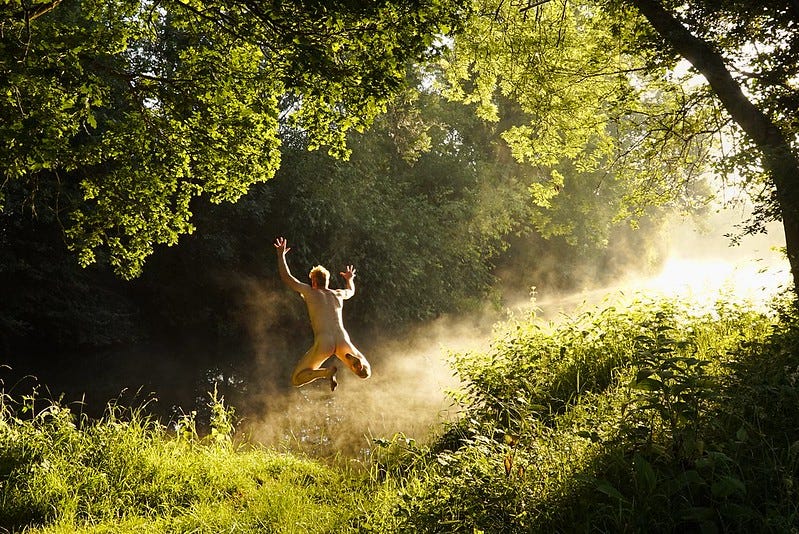



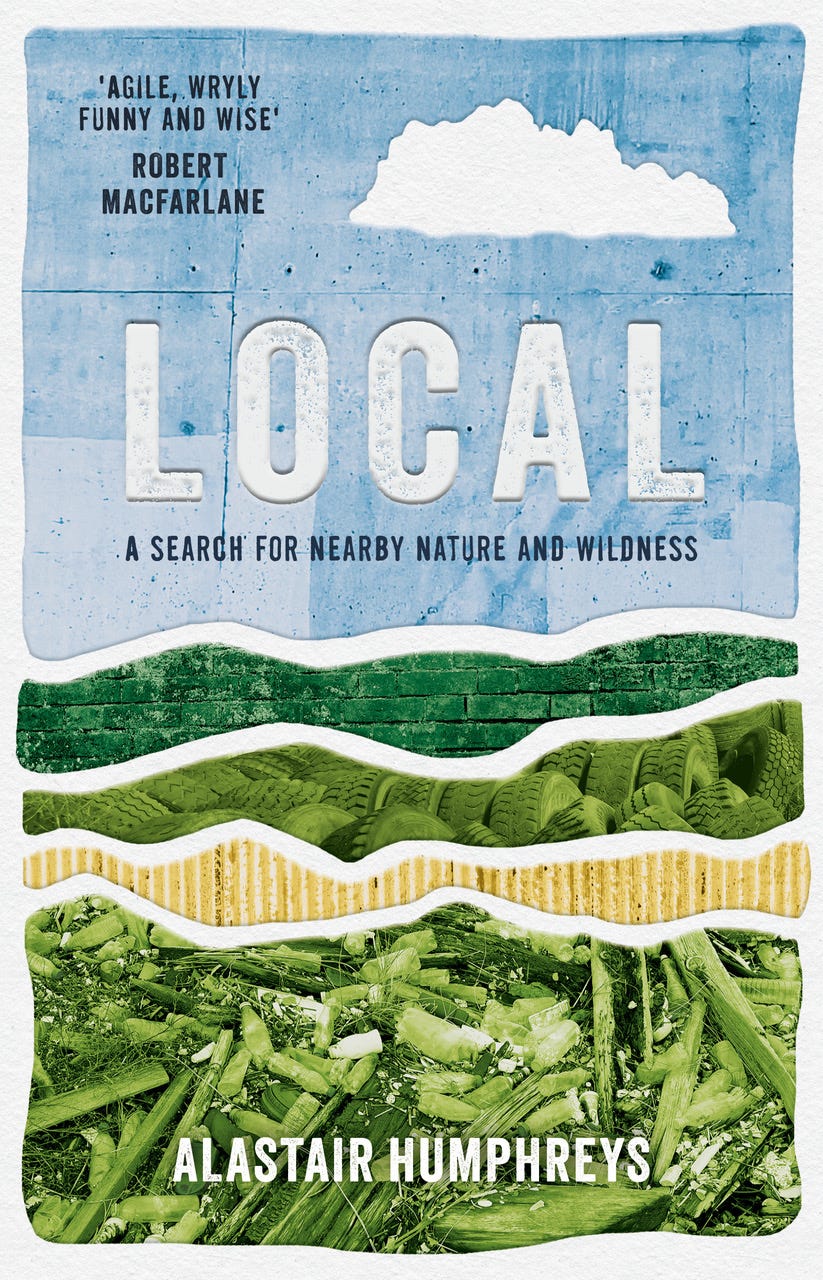
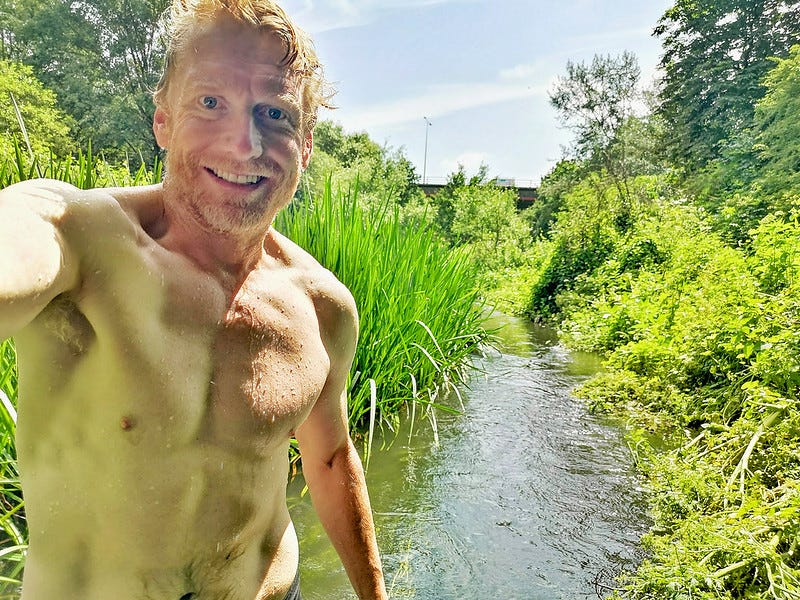
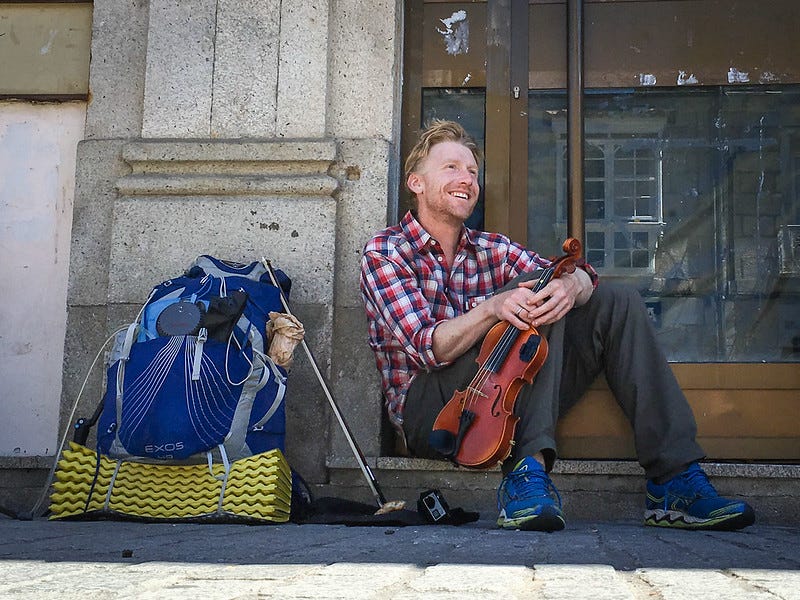
Oh wow! Came here from the Freelance Jungle. Love the idea of microadventures - thank you! That might be a goal for 2024!